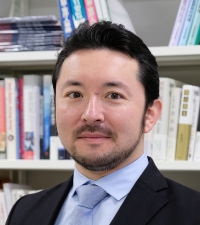About the lecturer
| My research focuses on political institutions, particularly electoral systems, constitutional design, and public attitudes towards institutional change. More recently, I have been working on the effects of the COVID-19 pandemic on Japanese politics. I am an Irish national who was raised in Tokyo. I received my BA in public policy from Princeton University and PhD in political science from Stanford University, and previously taught at the University of Michigan, before moving to UTokyo in 2015. | 
Prof. Kenneth Mori McElwain
|
Introduction video
Contemporary Japanese Politics
Syllabus
| 1 | Subject | Contemporary Japanese Politics |
| 2 | Field | Political science |
| 3 | Key words | Democracy; political institutions; public opinion; political parties; policymaking |
| 4 | Global Unit | 1 |
| 5 | Lecturer | Kenneth Mori McElwain |
| 6 | Period | July 3 - 14, 2023 |
| 7 | Time | 5:00-6:30pm (Japan Standard Time) |
| 8 | Lecture style | In-person (on Hongo Campus) |
| 9 | Evaluation Criteria | Excellent (S) 90 –100%; Very good (A) 80–89%; Good (B) 70–79%; Pass (C) 60–69%; Fail (D) 0–59% |
| 10 | Evaluation methods | Class participation: 40% One reading report (presentation): 20% One research report (1000 words): 40% |
| 11 | Prerequisites | None |
| 12 | Contents | Purpose Students who complete this course will gain an understanding of important political issues in Japan, such as the electoral dominance of the Liberal Democratic Party, the institutions that govern central and local policymaking, and the domestic and international challenges that the nation faces today. The course will explore these topics through two lenses. First, we trace how Japanese politics has evolved in the postwar period, using domestic history to inform contemporary events. Second, we will apply findings from the comparative politics literature to assess whether Japan is a relatively typical/atypical case among developed democracies. Description Each session will mix lectures by the instructor (~30 minutes), small-group discussions among students on specific topics and questions (~30 minutes), and then an overall debriefing and discussion with the entire class (~30 minutes). Schedule 1. Introduction to Japanese political institutions 2. Electoral and party systems 3. LDP dominance 4. What Japanese voters want 5. Political leadership 6. Redistributive politics 7. Industrial policy 8. Abenomics, inequality, and growth 9. Postwar security policy 10. Constitutional revision Assignments Students will be expected to participate actively in class discussions. In addition, each student will give ONE in-class presentation (10 minutes) on an assigned reading, and write ONE research report (~1000 words) that compares politics in Japan with that of another country on a topic of the student’s choice. |
| 13 | Required readings | Will be provided through the UTelF in advance. |
| 14 | Reference readings | - |
| 15 | Notes on Taking the Course | - |
Contact
UTokyo Global Unit Courses
International Exchange Group, Education and Student Support Department,
The University of Tokyo, 7-3-1, Hongo, Bunkyo-ku, Tokyo 113-8652 JAPAN
Please send all inquiries regarding the courses to the following email address:
utokyo-guc.adm(at)gs.mail.u-tokyo.ac.jp *Please change (at) to @
International Exchange Group, Education and Student Support Department,
The University of Tokyo, 7-3-1, Hongo, Bunkyo-ku, Tokyo 113-8652 JAPAN
Please send all inquiries regarding the courses to the following email address:
utokyo-guc.adm(at)gs.mail.u-tokyo.ac.jp *Please change (at) to @






